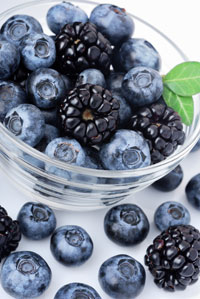Blueberry Anthocyanins Boost BDNF for Brain Health

Brain-derived neurotrophic factor (BDNF) is essentially the fountain of youth for brain health and plasticity, helping to promote new nerve connections associated with healthy cognitive function. A new study proves that it is the anthocyanins of blueberry that are one very powerful way to boost BDNF levels.
This research was done with animals and shows that 6 weeks of anthocyanin supplementation in old rats improved their spatial memory function. It did this in direct correlation to elevation of brain levels of BDNF in the hippocampus region of the brain which is responsible for memory.
It is well known that the conversion of data in recent short-term memory into long-term memory is regulated at the molecular level in neurons and requires the synthesis of new proteins that help nerve growth and connectivity. The synaptic plasticity of both short and long term neurons have recently been proven to require BDNF for optimal function.
BDNF levels decline with age with waning memory performance and cognitive skill. As they go down the brain becomes more "stiff" and less able to adapt and learn.
Aerobic exercise is a healthy way to help boost BDNF. Various flavonoid nutrients have been shown to help BDNF. As I pointed out earlier in the week, tangeretin and nobiletin are two citrus flavonoids that can help. There are others. The current study demonstrates that blueberries are quite powerful at boosting BDNF.
I have been reporting for some time on the benefits of blueberries for brain health, via multiple mechanisms. This latest study adds to an impressive body of science on the topic of blueberries and brain health.
This research was done with animals and shows that 6 weeks of anthocyanin supplementation in old rats improved their spatial memory function. It did this in direct correlation to elevation of brain levels of BDNF in the hippocampus region of the brain which is responsible for memory.
It is well known that the conversion of data in recent short-term memory into long-term memory is regulated at the molecular level in neurons and requires the synthesis of new proteins that help nerve growth and connectivity. The synaptic plasticity of both short and long term neurons have recently been proven to require BDNF for optimal function.
BDNF levels decline with age with waning memory performance and cognitive skill. As they go down the brain becomes more "stiff" and less able to adapt and learn.
Aerobic exercise is a healthy way to help boost BDNF. Various flavonoid nutrients have been shown to help BDNF. As I pointed out earlier in the week, tangeretin and nobiletin are two citrus flavonoids that can help. There are others. The current study demonstrates that blueberries are quite powerful at boosting BDNF.
I have been reporting for some time on the benefits of blueberries for brain health, via multiple mechanisms. This latest study adds to an impressive body of science on the topic of blueberries and brain health.
Share This Article
Search thousands of health news articles!
